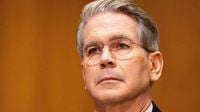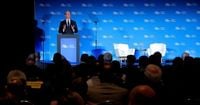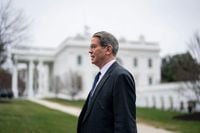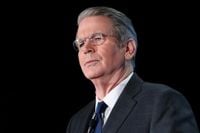U.S. Treasury Secretary Scott Bessent sparked optimism among investors on April 22, 2025, when he stated that the ongoing trade war between the United States and China is "unsustainable" and expressed expectations of a forthcoming de-escalation. Speaking at a private investor summit hosted by JPMorgan Chase in Washington, D.C., Bessent highlighted the burden of the high tariffs currently imposed by both nations, which he likened to a two-way embargo.
According to sources who attended the closed-door event, Bessent remarked, "No one thinks the current status quo is sustainable," referring to the steep tariffs that have strained economic relations between the two largest economies in the world. He suggested that a resolution might be on the horizon, potentially providing relief to the markets. His comments came at a time when the U.S. tariffs on Chinese goods have reached a staggering 145%, while China retaliated with tariffs of 125% on U.S. imports.
The market reacted positively to Bessent's remarks, with major U.S. stock indexes experiencing significant gains. The Dow Jones Industrial Average (DJIA) surged over 1,000 points, reaching 39,200, as investor sentiment improved. Gold prices fell below $3,400, and the U.S. dollar strengthened against other currencies, reflecting a shift in market dynamics.
During the summit, Bessent emphasized that the goal of the Trump administration is not to decouple from China but to seek a "big, beautiful rebalancing" of the economic relationship. He acknowledged that while negotiations have not yet commenced, a potential deal could emerge that would benefit both countries. Bessent stated, "There is a big deal to be done," indicating his belief in the possibility of a constructive dialogue moving forward.
President Donald Trump had previously announced a new set of tariffs on April 2, 2025, aimed at various countries, but chose to pause many of these tariffs for 90 days, excluding China. This decision came amid rising tensions and criticism of the Federal Reserve's monetary policy. Trump’s comments about potentially firing Federal Reserve Chair Jay Powell had contributed to market volatility earlier in the week.
As Bessent's comments resonated with the business community, White House Press Secretary Karoline Leavitt also expressed optimism regarding trade negotiations with China. She noted that Trump is preparing for a potential trade deal and asserted that "the ball is moving in the right direction." However, she refrained from confirming whether Trump had directly communicated with Chinese President Xi Jinping.
The trade conflict between the U.S. and China has roots dating back to early 2018 when Trump first imposed tariffs, citing unfair trade practices and intellectual property theft by China. The situation escalated until the two nations signed the Phase One trade deal in January 2020, which aimed to restore stability. However, the COVID-19 pandemic shifted focus away from trade tensions.
Despite the previous agreements, the return of Trump to the presidency in January 2025 reignited the trade war, with Trump pledging to impose tariffs as high as 60% on Chinese goods during his campaign. This has led to ongoing economic repercussions, including disruptions in global supply chains and increased inflationary pressures.
As the U.S. looks to enhance its manufacturing capabilities and reduce reliance on Chinese imports, Bessent's insights suggest a willingness for both sides to explore avenues for cooperation. He noted the importance of rebalancing trade, stating, "It may be possible to rebalance their relationship over time," while acknowledging the challenges that lie ahead.
While the exact timeline for negotiations remains uncertain, the prospect of de-escalation has provided a glimmer of hope for investors and businesses alike. With the stakes high and the economic landscape continually evolving, many are watching closely to see how the U.S.-China relationship will unfold in the coming months.
The potential for a resolution to the trade war could have far-reaching implications, not only for the economies of the U.S. and China but also for global markets. As discussions progress, the focus will remain on finding a mutually beneficial agreement that addresses the concerns of both nations while fostering economic stability.
In summary, Secretary Bessent's remarks have injected a sense of cautious optimism into the financial markets, with many hoping for a return to more constructive trade relations. The path forward may be fraught with challenges, but the desire for a resolution appears stronger than ever.








